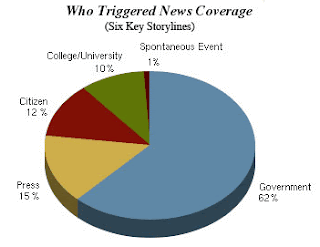 NBC New York has a story about the controversy surrounding New York City's new HIV public service announcements. Some gay rights groups want them pulled saying that they stigmatize homosexuals, while other groups say that the ads should stay because they are starting a conversation about a very important topic.
NBC New York has a story about the controversy surrounding New York City's new HIV public service announcements. Some gay rights groups want them pulled saying that they stigmatize homosexuals, while other groups say that the ads should stay because they are starting a conversation about a very important topic.My question is - Does anyone know what the effects of these PSAs actually are? I really hope that the Health Department tested these ads before running them and this controversy is just speculation on the part of advocacy groups. With focus groups and interviews, health communication researchers can answer these sorts of questions and prevent organizations like the Public Health Department from needlessly spending money on ads that have little, or worse, no effect. Let's hope the communication research process intervened here.


























